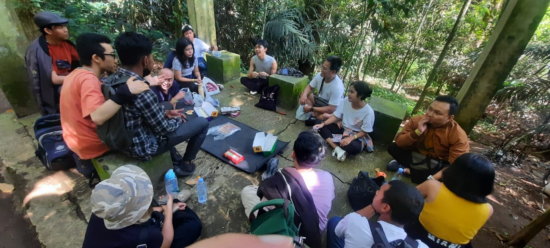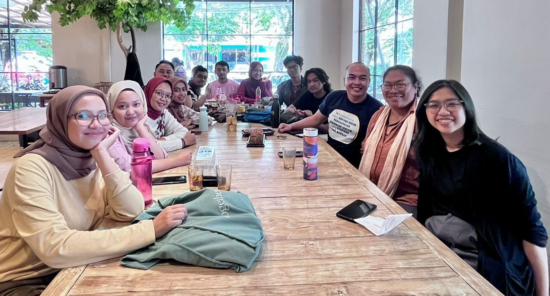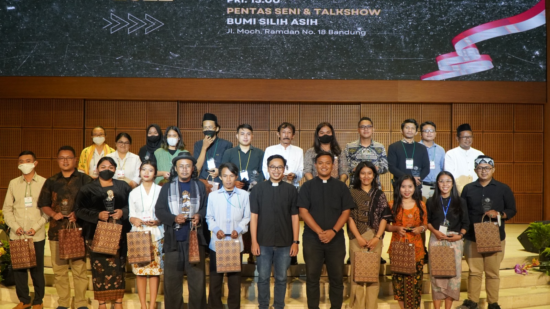By Fanny Syariful Alam, Regional Coordinator, Bandung School of Peace Indonesia
Editor’s Note: Fanny Syariful Alam is an International Visitor Leadership Program (IVLP) alumnus from Indonesia. His IVLP, “Youth Political Engagement in the Digital Age: A Project for Indonesia,” was organized in January 2020 by Graduate School USA in collaboration with the World Affairs Council of New Hampshire, Northern Nevada International Center, and Iowa International Center. Fanny is also a columnist, social activist, and regional coordinator at the Bandung School of Peace Indonesia—an organization that supports and encourages youth engagement in civic life.
All images provided by the author.

Interfaith community meet-up on the island of Bandung, Indonesia.
It was an honor to attend an interfaith dialogue organized by the U.S. Embassy in Indonesia on May 2, 2023. The event aimed to promote interfaith dialogue as a tool to foster social cohesion in diverse democracies like Indonesia and the United States. I eagerly embraced the opportunity to contribute to this meaningful exchange of ideas, which included 12 other prominent religious scholars, practitioners, and community leaders. My role as a regional coordinator at Bandung School of Peace Indonesia enables me to empower young people in civic life, including promoting a harmonious interfaith relationship among young people of different religions.
At the interfaith event, Jordan E. Younes, the organizer from the Political Section at the U.S. Embassy, highlighted the importance of interfaith dialogue. Indonesia stands as one of the world’s most diverse nations and encompasses various religions, beliefs, races, and ethnicities. Many Indonesians see the importance of religion in their daily lives, as evidenced by the pervasive cultivation of religious values and views in families, educational institutions, workplaces, and beyond. Recognizing this integral role of religion in the lives of many Indonesians, the dialogue intended to highlight the extent that interfaith dialogue might contribute to social cohesion and democracy in Indonesia.

Fanny (third from right) facilitates an interfaith workshop for students to develop critical thinking and cross-cultural skills.
Underlying Background and Challenges
Since its establishment as an independent country, Indonesia has been committed to preserving its citizens’ civil and political rights, including religious freedom. The Indonesian Constitution guarantees citizens’ religious rights, emphasizes the freedom to practice religion, and highlights the State’s commitment to safeguarding religious independence and beliefs for all Indonesians. In the international context, Indonesia has ratified the International Covenant of Civil and Political Rights (ICCPR), which underscores the State’s duty to protect religious rights and freedom for all Indonesians and allows them to choose their religions or beliefs based on their conscience. This protection extends to interpreting and practicing their religions and beliefs in prayer, observance, and teaching.
However, the implementation of the laws is sometimes inconsistent or inadequate. Often, many minority religious groups are discriminated against as well. A source of these conflicts includes suspicions of other religions and beliefs, provocations, and local authority regulations.
During the interfaith event, one of the participants reflected on the cancellation of the World Cup-20 event in Indonesia due to intense protests against the participation of Israel, as an example of distrust of other religions. I, representing the Bandung School of Peace Indonesia, also underscored how discriminatory practices can damage minority communities. For example, the Indonesian government and authorities frequently defend a specific religious group or community, which can lead to some discriminatory actions, such as the closure of religious minorities’ houses of worship and the disbandment of their religious activities. Our concerns are heightened with the upcoming political year, considering that identity politics – particularly regarding religion – appears to be the key to winning the election.
My IVLP Experience to Address Interfaith Dialogue
In the Indonesian context, interfaith dialogue is key to addressing potential conflicts among religious groups, especially with the upcoming political year. For example, those invited to the event hosted by the U.S. Embassy can play a key role in bridging interfaith dialogue between their peers and the public. This is likewise something I learned by participating in the International Visitor Leadership Program (IVLP) in 2020.
As an alumnus of IVLP, I can say my IVLP experience has had a real impact on my community work. I remember one of my IVLP meetings was with a Pastor of the Family Church in Iowa. We had a friendly discussion about the church, its lessons, and its impacts on society. The conversation culminated in a dialogue on how to reduce prejudice between the Church people and people of different religions in our IVLP group.
We also met with NextGen America, a nonprofit that works to engage and mobilize young voters. Through that IVLP meeting, I learned how they use social media to involve young U.S. citizens politically. This is particularly relevant given the upcoming 2024 elections in Indonesia, and because social media can exponentially enlarge the exchange and dissemination of information. I am concerned that social media will be used to exacerbate religious tensions, create polarizing online echo-chambers, and unduly promote political incumbents based on religious rhetoric.
It is not simple work to address the issue of interfaith dialogues and civic engagement because of the complex nature of these topics. Since my work began at the School of Peace in 2018, I have worked to address interfaith dialogue and civic engagement by gathering young Hindus, Buddhists, Muslims, Christians, and individuals from other religious groups in my weekend class. I see the importance of doing this to develop my students critical thinking skills and promote cross-cultural understanding through dialogue, which supports their religious and civil rights in Indonesia. I can see the impact my class has on my community members; they are more open-minded and empathetic, and more open to discussing both challenges and opportunities for interfaith dialogue. As a result, in November 2022, our community’s work was awarded the Silih Asuh Awards by the Catholic Diocese of Bandung for promoting harmonious and tolerant interfaith relations among young people in my city.

Participants at the Silih Asuh Award ceremony. The award for the Bandung School of Peace is received by the representative on the far left.
I believe that dialogue is key to cross-cultural understanding. It opens our minds, allows us to see different perspectives, and enables us to develop our critical thinking and problem-mapping skills. By participating in the IVLP, I gained valuable tools and ideas that are helping me bring together various groups of people, particularly interfaith groups. The IVLP provided me with a platform to practice inclusive democracy with my young community members, and this platform has only grown thanks to my attending the U.S. Embassy’s interfaith event. I discovered that interfaith dialogue could be a significant means of building social cohesion between the diverse citizens of Indonesia. Youth participation in Indonesian interfaith dialogues remains a point of emphasis to work through and is particularly relevant to addressing political conflicts regarding religious issues in the upcoming political year. I believe that interfaith dialogue can help contribute to a more inclusive and just democracy in Indonesia. My work to promote youth civic engagement, especially around interfaith dialogue, is not over yet.
